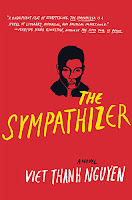 |
| The Sympathizer by Viet Thanh Nguyen (Grove Press, 2015) |
“I am a spy, a sleeper, a spook, a man of two faces.” This is the first line of my novel, The Sympathizer, and in it you can hear the echo of another novel. “I am an invisible man,” Ralph Ellison wrote. “No, I am not a spook like those who haunted Edgar Allan Poe; nor am I one of your Hollywood-movie ectoplasms.” A few lines later in my first paragraph, I continue to evoke Invisible Man with this sentence: “I am not some misunderstood mutant from a comic book or a horror movie, although some have treated me as such.”Born in Vietnam and raised in the United States, Viet Thanh Nguyen teaches English and American Studies at the University of Southern California and lives in Los Angeles. His fiction has appeared in Best New American Voices, TriQuarterly, Narrative, and the Chicago Tribune. The Sympathizer was called “remarkable” and “gripping” in the New York Times Book Review by Philip Caputo, who also wrote that Nguyen’s depiction of his double-agent narrator “compares favorably with masters like Conrad, Greene, and le Carré.”
These references constitute part of my homage to Ellison, but my greatest gesture of respect has been to take his surname for my son’s first name. Most people do not get the allusion, never having read Ellison’s book. For those that do get it, the name functions as a password. You and I, we believe in the power of the word, of the book, of literature.
I feel a debt to Ellison because Invisible Man performs the essential maneuver that I hope marks my own aesthetic, which is the treatment of marginalized experience as universal experience. He foreshadowed Toni Morrison, who unapologetically declares her intentions to write about Black people for Black people. Everyone else can listen in and follow along.
In Ellison’s case, if there was not quite the same degree of defiance, perhaps he made that defiance possible. He himself followed on W.E.B. Du Bois’s insight in The Souls of Black Folk that the Negro was a person of double-consciousness, always seeing himself through his own eyes and the eyes of others. Is there a better definition of modern consciousness? This one has been routed through Black history, injury, and perception, as well as the crucial conviction that the other side of Old World Enlightenment was New World slavery and colonialism. This dark side, what scholar Paul Gilroy memorably calls the Black Atlantic, produced equally rich insight from the depths of slave ships and the plantation system’s concentration camps. Ellison riffed on double-consciousness to arrive at the sense that a Black man was always invisible to white people—until the moment when he was too visible.
I am not Black but I have felt a small degree of simultaneous invisibility and hypervisibility, occasioned by a parallel history of war and anti-Asian racism. I have sat at a most genial dinner of rich, powerful, old white alum of an Ivy League university where, apropos of nothing, except for the fact that I was the sole Asian American at the table—indeed, in the entire dining room—a ninety-six-year-old executive who flew in bombers during the Pacific War said that dropping the atomic bomb on Japan was the right thing to do. The unprovoked warning was clear, not that I needed it. I had already written the scene in my novel where a Cold War pundit tells my narrator exactly the same thing about Hiroshima and Nagasaki as he, too, sat at dinner, in close quarters “with some representative specimens of the most dangerous creature in the history of the world, the white man in a suit.”
Invisible Man
by Ralph Ellison
(Random House, 1952)
So, in a world where apocalypse exists as more than a mad threat, at least for people of darker shade, what is the function of fiction? For Ellison, writing during the Atomic Age and the Cold War, the novel as form was a “raft of hope.” I agree, as any writer probably will, but I also differ. A raft is only large enough for one person, perhaps two, which is why the invisible man, after being stung by the failure of his revolution, and after retreating to a hole, eventually emerges by himself. My narrator, too, confronts the failure of his revolution, and he, too, goes into a kind of a hole. But when he emerges, he finds himself not on a raft but on a boat, and not by himself but among a crowd of the revolution’s castoffs. For him, the antidote to a failed revolution is not individualism, which appeals so much to Americans, but a doubling of faith—perhaps foolish faith—in the solidarity and collectivism that is a part of both revolution and democracy.
Although I end my novel by revising Ellison, I am nevertheless invoking him. His insights remain, for the nightmare from which his invisible man was struggling to awaken continues today, when it remains necessary to say that Black Lives Matter. We still live in Ellison’s moment.
Previously in this series:
“Influences” posts by Deborah Baker, Kate Christensen, Jennifer Gilmore, Lauren Groff, Lev Grossman, Jane Hirschfield, Alan Heathcock, Adam Levin, Dawn McGuire, Dinaw Mengestu, Jim Moore, Manuel Muñoz, Maggie Nelson, Geoffrey O’Brien, Arthur Phillips, Carl Phillips, Karen Russell, Timothy Schaffert, Philip Schultz, Mark Statman, Emma Straub, J. Courtney Sullivan, Ellen Ullman, and Adam Wilson


No comments:
Post a Comment